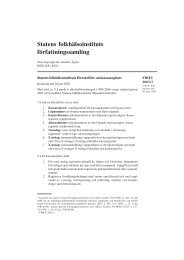Alkoholmonopol och folkhälsa - Statens folkhälsoinstitut
Alkoholmonopol och folkhälsa - Statens folkhälsoinstitut
Alkoholmonopol och folkhälsa - Statens folkhälsoinstitut
You also want an ePaper? Increase the reach of your titles
YUMPU automatically turns print PDFs into web optimized ePapers that Google loves.
16 alkoholmonopol <strong>och</strong> <strong>folkhälsa</strong><br />
Effect of increased alcohol consumption on vulnerable groups<br />
Alcohol policy addresses not only the overall effects on health and social problems of<br />
alcohol consumption in the population; it often also addresses the consequences for particularly<br />
vulnerable groups. Thus certain regulations focus on restricting consumption and<br />
limiting injury and harm in young people, such as age limits and restrictions regarding<br />
advertising that targets young people. Other regulations are aimed at heavy consumers,<br />
such as regulations regarding overserving and the sale of alcohol to intoxicated persons.<br />
In comparison to other retail systems, the Swedish monopoly is very effective when it<br />
comes to enforcing the age limit for purchasing alcohol. It is probable that privatization<br />
would entail a less effective enforcement of the age limit, and thereby an increase in the<br />
availability of alcohol for young people. Young people are especially sensitive to advertising<br />
and marketing, and it is probable that privatization would lead to increased advertising<br />
and marketing, which would probably lead to a relative increase in young people’s consumption.<br />
We do not know whether regulations concerning the sale of alcohol to intoxicated<br />
individuals are better enforced under a monopoly than in privatized sales, but it<br />
would seem likely that this would be the case.<br />
In addition to measures that specifically target vulnerable groups, there is evidence<br />
that some general measures have a greater effect on vulnerable groups than on other<br />
groups of consumers. In comparison to other consumer groups, both young people and<br />
heavy consumers are more sensitive to price changes and an increased concentration of<br />
sales outlets. Thus, if a privatization of alcohol sales involves discount products being<br />
introduced to the market and/or an increase to the number of sales outlets, it is likely that<br />
consumption will increase among young people and heavy consumers. It has furthermore<br />
been established that when the total consumption increases, the consumption of heavy<br />
consumers also increases relative to other consumers.<br />
This study did not analyse the extent of the effects of changes to alcohol policy with<br />
respect to vulnerable groups. Based on our review of current scientific research, however,<br />
we can conclude that privatizing the Swedish retail market for alcohol would likely lead<br />
to a significant increase in alcohol consumption and thereby also in alcohol-related harm<br />
among particularly vulnerable groups such as young people and heavy consumers.<br />
Summary and conclusions<br />
The retail monopoly for alcohol has been questioned ever since Sweden joined the EU.<br />
There has also been constant pressure to do away with other aspects of the national alcohol<br />
policy established in Sweden in an aim to protect public health and safety. Even though<br />
the EC Court of Justice has upheld the legality of the monopoly on retail, there have been<br />
a series of other pressures to reduce the effects of the monopoly. The EC Court’s recent<br />
ruling to nullify the Swedish ban on Internet sales is an example of this.<br />
In a system of licensed private liquor stores, higher product sales lead to higher profits.<br />
For most products, increased competition leads to lower prices and greater availability
















